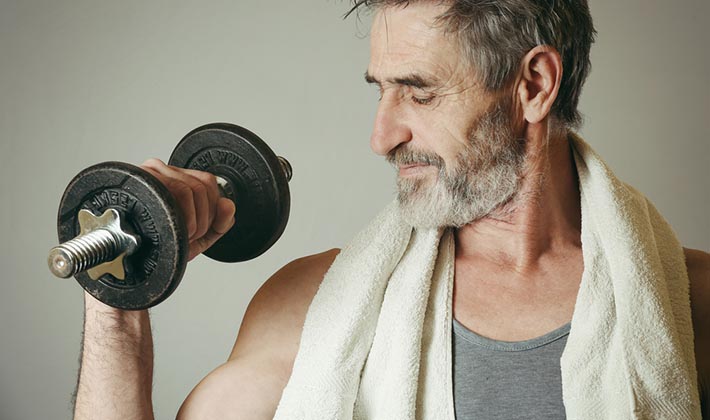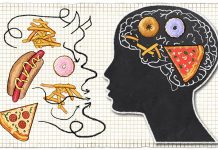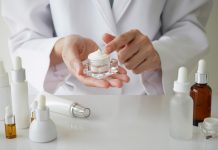Some people believe that andropause – the male equivalent of menopause – is a myth. But it’s a little more complicated than that. We’ll take a closer look at what andropause actually is and what it means for men over the age of 45. We’ll also give you some helpful tips about how to stay strong, healthy, and enjoy a vigorous sex life as you get older.
Taking a Closer Look at Andropause – and What it Means for You
People use the terms “male menopause” and “andropause” interchangeably. They both describe the same accumulation of symptoms which signal a natural decline in testosterone production as men age. In fact, some of the most annoying symptoms of menopause in women are also experienced in men during andropause. Some of these symptoms include:
- Fatigue
- Increased instances of moodiness and depression
- Insomnia
- Shrinking muscles and physical weakness
- Sexual dysfunction and infertility
- Increased body fat and even breast development
- Hot flashes
If you notice any of the andropause symptoms above – especially if they’re having a negative impact on your quality of life – then it’s time to talk to your doctor. They can take a simple blood test to show where your testosterone levels are at. If you test positive for low testosterone, don’t worry – there are lots of ways to boost your T-levels back up to where they belong.
How to Slow – or Stop – Testosterone Loss After Age 45
We want to take a minute to note one very important difference between menopause in women and andropause in men: menopause signals a permanent loss of fertility. Once the ovaries shut down, that’s it; there’s nothing she’ll ever be able to do to improve fertility and get pregnant again. This is not the case with men. Although your fertility will naturally decline with age, if you eat right, weight train frequently, and enjoy a healthy sex life, you can keep producing viable sperm until the day you die. And while it may not be practical or medically necessary to be able to impregnate a woman in your 80s or 90s, it’s still a point of pride for most men to maintain healthy testosterone levels as they age.
Eating a High-Testosterone Diet
Your diet has a much stronger influence on how well you age then most people think. If you want to boost your T-levels, you need to start eating a high-testosterone diet. But what does that look like? We took a cue from some of the experts and discovered that a high-testosterone diet typically includes:
- Lots of red meat – like beef, lamb, venison, or pork – because it contains such high levels of zinc
- Foods high in vitamin D, including tuna, milk, egg yolks, black beans, and mushrooms
- Shellfish like oysters, shrimp, and crab (again, because of the zinc content)
- Leafy greens like spinach, kale, and collard greens for the vitamins and minerals you need to produce testosterone molecules
- Cruciferous vegetables like broccoli and brussel sprouts for healthy hormone balance
Foods to avoid include soy products, which have a high phytoestrogen content; refined carbohydrates, which trigger belly fat accumulation; and farm-raised fish. Tainted fish contain large quantities of heavy metals which lower testosterone and cause baldness. Soy products and refined carbohydrates lower testosterone by increasing estrogen production.
Living a High-Testosterone Life

If you want higher testosterone levels, be sure to perform weight training exercises 3-4 times per week. This helps stimulate growth hormone production and build muscle – both of which are necessary to produce more testosterone.
Try to eliminate stress wherever possible. Stress increases your cortisol levels, and cortisol is the arch enemy of testosterone. When your body produces too much cortisol, it stops producing testosterone. So whatever helps you reduce your stress levels, do it!
Work on improving things in the bedroom. This includes both your sex life and your sleep habits. Sexual dysfunction symptoms like low libido, erectile dysfunction, and poor sexual endurance should be discussed with your doctor the moment you notice them. They can all be signs of cardiovascular disease in a worst-case scenario. Sexual dysfunction can also significantly decrease your quality of life, which can have an indirect on your physical health.
Sleep is important for high testosterone levels – but many men aren’t aware of this! In order for your body to produce testosterone, it needs to produce growth hormone first. And nearly three-quarters of the growth hormone your body produces on a daily basis happens during deep sleep. But things like loud noises, too much light, and prescription sleeping medications prevent your body from getting the deep sleep it needs to produce growth hormone. So do your best to improve your sleep hygiene and get to sleep naturally so that you can keep your testosterone levels healthy.






















































